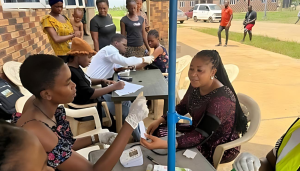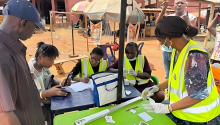Bridging the knowledge gap by taking action to tackle hypertension in Ebonyi state
Abakaliki, 5 August, 2024 - It was a warm Wednesday morning when the outreach team set up their makeshift clinic at the Ebonyi State Secretariat in Abakaliki Local Government Area in Ebonyi State, Southeast Nigeria.
The team, comprising Ebonyi State health workers, members of the Nigerian Medical Student Association, and partners, including staff of the World Health Organization (WHO), were out to provide free medical check-ups, educate the community on various health issues, with a focus on hypertension, and offer preventive care. The outreach was conducted to raise awareness about Hypertension and commemorate the 2024 World Hypertension Day.
The collaboration tagged “Operation Know your numbers”, conducted at the Market Square and other public places not only provided immediate medical assistance but also educated the community on fostering a culture of regular health check-ups, avoiding excessive salt intake, dangers of smoking, and preventive care.
Among the residents who benefitted from the outreach was Mr Nwanjoku Ignatius, a 58-year-old government official who was encouraged by his colleague to check his health status.
A surprising diagnosis
When it was his turn, Mr Nwanjoku sat down with a nurse who began the standard procedures: checking his weight, height, and blood pressure. The nurse’s expression soon turned serious, as Mr Nwanjoku’s blood pressure reading was alarmingly high. He was immediately referred to the doctor on site.
“Before the screening, I was not aware I had high blood pressure. I have always been doing my work, going to the farm, and travelling to my village without problems. I had no reason to visit a hospital for a long time”, he said.
Mr Nwanjoku was both shocked and confused. Reassured by the medical team onsite, they counselled him about the disease, the common risk factors and lifestyle modifications he should make. He was prescribed free medication to begin his treatment immediately. He was also referred to a health centre close to his locality for follow-up and regular check-ups. Days after taking medication, Mr Nwanjoku can attest that his numbers have reduced.
“I have cut a lot of things from my life to ensure I am healthy and I use my medication consistently as prescribed.”, he added.
Understanding hypertension
By the end of the five-day (20 to 25 May 2024) outreach, 518 persons were screened for hypertension, and 346 (67%) had abnormal readings with elevated blood pressure. Only 51 (10%) of those with abnormal BP had prior knowledge of their condition.
Other services offered included blood sugar screening for diabetes and body mass index measures to determine whether individuals were underweight, overweight, or obese.
Findings from the outreach program highlighted a critical issue: the prevalence of undiagnosed hypertension in the community is critically high. Many residents, like Mr Nwanjoku, are unaware of their health status and the risks they face.
Hypertension is a major risk factor for cardiovascular disease and a major cause of premature death worldwide. Often referred to as high blood pressure, hypertension, is a condition where the force of the blood against the artery walls is too high.
Globally, an estimated 1.28 billion adults aged 30 to 79 have hypertension with most (two-thirds) living in low- and middle-income countries. An estimated 46% of adults with hypertension are unaware that they have the condition, less than half of adults (42%) with hypertension are diagnosed and treated and approximately 1 in 5 adults (21%) with hypertension have it under control.
In Nigeria, one in every three adults is hypertensive. One of the global targets for non-communicable diseases is to reduce the prevalence of hypertension by 33% between 2010 and 2030.
A Routine check
Dr Hyacinth Ebenyi the Director for Public Health of the ESMoH, who commended WHO for the intervention, took time to explain hypertension to the public during the campaign, said “ "Hypertension, often termed the silent killer, is a major public health challenge that demands our immediate attention. This condition affects millions and frequently goes undiagnosed until severe complications such as heart disease, stroke, kidney failure or even death occur.
We encourage all adults to check their blood pressure regularly as early detection saves lives. Once someone is diagnosed with hypertension early, the condition can be managed through lifestyle modification and medication.”
To conduct the outreach, WHO supported the state government in providing sensitization and educational materials, screening equipment, renovation and activation of the non-functional staff clinic at the State Secretariat with a Sphygmomanometer, glucometer, weighing scale, stadiometer for screening, examining couch, urinalysis test kit to further enable regular NCD screenings in the locality.
Additionally, WHO staff were on the ground during the outreach supporting health talks including hypertension and diabetes management, and counselling exercises.
Speaking on the outcome of the outreach, WHO State Coordinator, Dr Vivan Ibeziako said “ Hypertension is a preventable and manageable condition. With timely diagnosis and appropriate treatment, we can drastically reduce the burden of this disease.
It is time for coordinated action. By working together—government agencies, WHO, healthcare providers, and the public—we can create a healthier future where hypertension is no longer a silent threat. Let us commit to making hypertension awareness and management a national priority, ensuring better health outcomes for all." She said.




